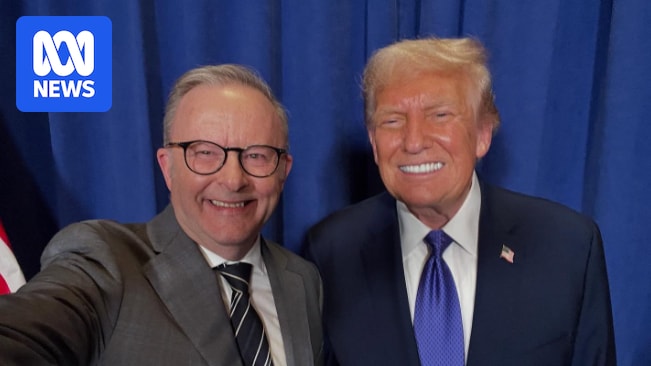A critical minerals deal will “no doubt” be part of discussions between Anthony Albanese and Donald Trump next week, the treasurer has confirmed.
Speaking from Washington, where he is meeting American counterparts ahead of the prime minister’s official visit next week, Jim Chalmers said Australia could be a “reliable partner” of the valuable commodities as the US seeks alternative buyers in a market dominated by China.
“We know that American companies desperately need critical minerals, and Australia is very well placed to service that need,” he said.
“This will be an important part of the discussions that I have … and no doubt it will be part of the discussions that Prime Minister Albanese has with President Trump next week.”
Jim Chalmers travelled to the United States for talks ahead of the prime minister’s arrival. (ABC News: Callum Flinn)
The cluster of prized metals, which Australia has in abundance but does not yet sell at scale, have long been speculated as an enticing offering for a president who takes an unapologetically transactional approach to diplomacy.
Last week, trade minister Don Farrell said his US counterpart had raised the issue with him and that a deal would be struck “one of these days”, suggesting it would involve some sort of US investment to help make Australian mining operations viable, in exchange for some form of guaranteed US access to what was extracted.
The issue has gained further prominence in recent weeks after Chinese threats to use its dominance to control the supply of the minerals, which are important for renewable technology and artificial intelligence.
The US also requires the minerals for most of its weapons.
Earlier this week, US Treasury Secretary Scott Bessent called China’s move “an exercise in economic coercion on every country in the world” and a step towards “decoupling” between China and the west.
As China flexes dominance on rare earths, Australia sees an opening
Mr Bessent vowed to speak with allies, including Australia, on “a fulsome group response”.
“China cannot manage the supply chain or the manufacturing process for the rest of the world,” he told US network CNBC.
Mr Chalmers said Australia’s interests were “best served by more trade, not by more trade barriers”.
“We will engage with our partners to make sure that we can be a very reliable supplier to meet the critical minerals needs of this country, here in the US and other markets around the world,” he said.
He said Australia was concerned that the market for critical minerals was not as reliable and robust as it could be when it came to the supply chains.
“Australia’s got a lot to offer to the world,” he said.
Subsidising a new mining boom
To grow the domestic industry, the Australian government has been considering subsidising the production and sale of critical minerals operations to give would-be mining investors the confidence they would otherwise lack.
On the production side, it already offers a variety of tax credits and cash injections under the banner of its industry support regime Future Made in Australia, which has a particular emphasis on “green” applications for the metals.
On the sale side, it has pledged $1.2 billion for a “strategic reserve” of the minerals, slated for next year but still in its design phase.
US wants Australia’s rare earths
Though this may include a physical stockpile, it is more likely to be an assurance that miners will receive a minimum price for what they can produce.
Miners could then strike future purchase agreements with buyers, backed by the comfort that the government would make good on the minimum price if market conditions were unfavourable.
The government’s involvement may take the form of a financial derivative, a “paper promise” to make up any price shortfall, but where the government would itself profit if the price was higher than expected.
While the idea of price security was that it would create the space for Australian miners to enter into voluntary and profitable deals with foreign buyers, the government intended to partner with its allies to guide that process along.
This is where the US could come in, perhaps agreeing to invest in mining operations in exchange for some sort of preferential access to what those operations produce. Similar discussions are already underway with Japan, South Korea, and Europe.
China’s threats to exert greater control over not just the export and refinement of minerals, but also their applications, has catapulted the issue to front of mind for the US government, which has begun stockpiling minerals with defence applications.
While it has a variety of options for a variety of minerals, including Canada and South America, Australia’s reserves have been raised through official channels and have been linked to securing Australian exemptions from the Trump administration’s tariffs.

